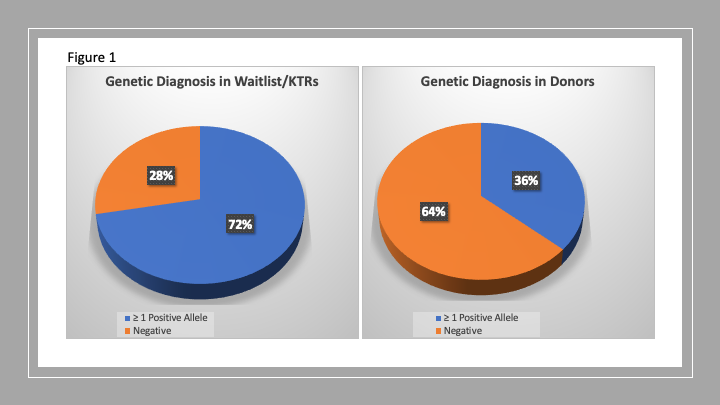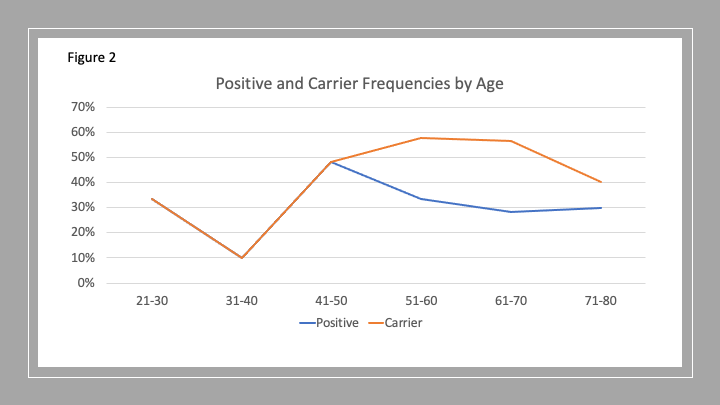Does Gene Mutation Carrier Status Contribute to Risk of Kidney Failure?
Renal Division, Brigham and Women's Hospital, Boston, MA
Meeting: 2022 American Transplant Congress
Abstract number: 1422
Topic: Clinical Science » Kidney » 49 - Recurrent Kidney Disease & Genetics
Session Information
Session Name: Recurrent Kidney Disease & Genetics
Session Type: Poster Abstract
Date: Monday, June 6, 2022
Session Time: 7:00pm-8:00pm
 Presentation Time: 7:00pm-8:00pm
Presentation Time: 7:00pm-8:00pm
Location: Hynes Halls C & D
*Purpose: To examine the frequency of genetic abnormalities in end stage kidney disease patients either on the kidney transplant waitlist or have already been transplanted.
*Methods: We used the commercially available Renasight Test, a Next-Generation Sequencing non-targeted panel of >380 genes associated with kidney disease to assess 150 ESRD patients either transplanted or on the kidney transplant waitlist. We also tested 22 potential kidney donors, nearly all of whom were blood relatives of the potential donors. Blood or saliva samples were collected and results were available within 3-4 weeks of testing.
*Results: Of the 150 patients tested 130 were waitlisted patients and 20 were previously transplanted, of whom 65 were female. Ninety of the patients identified as white, 45 Black and 15 as Asian or mixed race. Sixteen patients were Hispanic. In line with other genetic studies of CKD populations a genetic diagnosis was identified in 31% of all patients (49% of Blacks, 24% of whites, 13% of others). Interestingly 53% of all waitlist/transplanted patients were diagnosed as having a single allele abnormality (carrier status) compared to 27% of the donors. The proportion of patients with at least 1 abnormal allele (positives + carriers) is shown in figure 1. Most patients were tested at the time of waitlisting and the distribution by age is shown in figure 2. A positive carrier status was more commonly reported in older patients. Of the 45 Black patients, 18 of the 22 positive results were APOL1 gene related and 9 were identified as having sickle cell trait, double the reported prevalence in the Black non-transplant population. This appears to be congruent with a recent study that found an association between sickle cell trait and risk of chronic kidney disease.
*Conclusions: In our study the proportion of ESRD patients identified as being ‘carriers’ for a kidney disease associated gene was substantially higher than that found in the ‘donor’ population suggesting that a carrier state may not always denote a benign status and may predispose to a higher risk of kidney disease particularly manifesting in older patients. These results are based on small numbers of patients and certainly need to be confirmed in larger studies.
To cite this abstract in AMA style:
Muhsin SA, Saranu R, Schreiber B, Milford E, Yeung MY, Chandraker A. Does Gene Mutation Carrier Status Contribute to Risk of Kidney Failure? [abstract]. Am J Transplant. 2022; 22 (suppl 3). https://atcmeetingabstracts.com/abstract/does-gene-mutation-carrier-status-contribute-to-risk-of-kidney-failure/. Accessed February 22, 2026.« Back to 2022 American Transplant Congress


